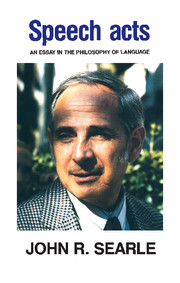

Runciman, W. G. 1969. The sociological explanation of ‘religious’ beliefs. European Journal of Sociology, Vol. 10, Issue. 2, p. 149.
Huddleston, Rodney 1970. Two approaches to the analysis of tags. Journal of Linguistics, Vol. 6, Issue. 2, p. 215.
Bermúdez Bausela, Montserrat 1970. Aplicación del modelo de 2015 de Juliane House de evaluación de la calidad de una traducción a un texto literario: caso práctico. Estudios de Traducción, Vol. 7, Issue. , p. 163.
Habermas, Jürgen 1970. Towards a theory of communicative competence. Inquiry, Vol. 13, Issue. 1-4, p. 360.
Fillmore, Charles J. 1970. Subjects, speakers, and roles. Synthese, Vol. 21, Issue. 3-4, p. 251.Lambert, Dorothy Mack 1970. Some happiness conditions for explicit similes. Paper in Linguistics, Vol. 2, Issue. 2, p. 359.
Schnitzer, Marc L. 1971. Nominalization and entailment. Paper in Linguistics, Vol. 4, Issue. 3-4, p. 543.
Narveson, Jan 1971. Promising, Expecting, and Utility. Canadian Journal of Philosophy, Vol. 1, Issue. 2, p. 207.
Cameron, J. R. 1971. ‘Ought’ and Institutional Obligation. Philosophy, Vol. 46, Issue. 178, p. 309.Candlin, Christopher N. 1972. Sociolinguistics and Communicative Language Teaching. ITL - International Journal of Applied Linguistics, Vol. 16, Issue. , p. 37.
Rorty, Amelie Oksenberg 1972. Belief and self‐deception. Inquiry, Vol. 15, Issue. 1-4, p. 387.Beran, Harry 1972. Ought, obligation and duty. Australasian Journal of Philosophy, Vol. 50, Issue. 3, p. 207.
Helm, Paul 1972. Revealed Propositions and Timeless Truths. Religious Studies, Vol. 8, Issue. 2, p. 127.
Hannay, Alastair 1972. Mental illness and thelebensweltA discussion of Maurice Natanson (Ed.),Psychiatry and philosophy∗. Inquiry, Vol. 15, Issue. 1-4, p. 208.
King-Farlow, John 1972. Two Dogmas of Linguistic Empiricism. Dialogue, Vol. 11, Issue. 3, p. 325. Fillmore, Charles J. 1972. Semantics of Natural Language. p. 1.Dore, John 1973. A DEVELOPMENTAL THEORY OF SPEECH ACT PRODUCTION*. Transactions of the New York Academy of Sciences, Vol. 35, Issue. 8 Series II, p. 623.
Culler, Jonathan 1973. Seymour Chatman (ed.), Literary style: a symposium. London & New York: Oxford University Press, 1971. Pp. 427 + xv.. Journal of Linguistics, Vol. 9, Issue. 2, p. 356.
Scrimshaw, Peter 1973. Statements, Language and Art: Some Comments on Professor Hirst's Paper. Cambridge Journal of Education, Vol. 3, Issue. 3, p. 133.
Kempson, Ruth M. 1973. PRESUPPOSITION: A PROBLEM FOR LINGUISTIC THEORY. Transactions of the Philological Society, Vol. 72, Issue. 1, p. 29.
Publisher: Cambridge University Press Online publication date: June 2012 Print publication year: 1969 Online ISBN: 9781139173438 Digital access for individuals (PDF download and/or read online) Added to cart Digital access for individuals (PDF download and/or read online)Written in an outstandingly clear and lively style, this 1969 book provokes its readers to rethink issues they may have regarded as long since settled.
‘This small but tightly packed volume is easily the most substantial discussion of speech acts since John Austin’s How to do things with words and one of the most important contributions to the philosophy of language in recent decades.’
Source: The Philosophical Quarterly
‘This book has immediately, and justly, been accorded the status of a major contribution to the philosophy of language. The brilliant but programmatic insights of Austin’s How to do things with words are systematically developed and integrated with the more recent work of philosophers such as Grice, Rawls and Searle himself to produce an apparently comprehensive and certainly illuminating general theory, summarized in what Searle terms the ‘main hypothesis’ of the book, ‘speaking a language is engaging in a rule-governed form of behaviour.’
‘The main merit of Searle’s book - and it is a very substantial merit indeed - is that by attempting to construct a systematic theory of speech acts it substantially advances out knowledge of the problems that have to be solved in this fascinating field. Even if Searle himself has not yet found a wholly satisfactory way through the jungle, he has certainly established a number of clearings which will greatly facilitate subsequent explorations.’
Source: Philosophical Review
‘Written in an outstanding clear and lively style, it provokes its readers to rethink issues they may have regarded as long since settled.’
Source: The Times Literary Supplement